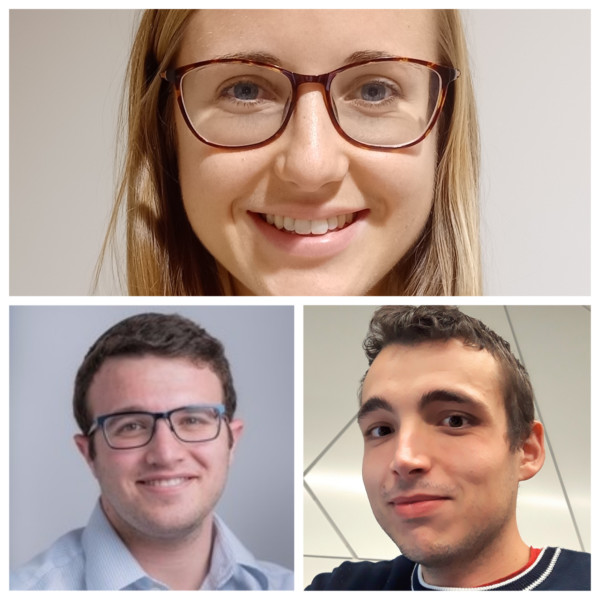Cancer themes research boosted by intake of new PhD students
Three post graduate students – Mikey Lebrett, Conrado Guerreo Quiles and Vicky Smith – have joined the NIHR Manchester Biomedical Research Centre this autumn to add more intellectual firepower to the cancer themes’ research portfolio.
Conrado and Vicky will work on the Advanced Radiotherapy theme and Mikey on Cancer Prevention and Early Detection.
25 year old Conrado will explore how hypoxia promotes the spread of cancer in order to develop new biomarkers and, in the long term, underpin the development of new therapeutics to prevent metastasis.
Hypoxia, a feature of some solid tumours (meaning they are very low in oxygen), confers a poor prognosis irrespective of treatment. It alters tumour cell behaviour often resulting in increased migratory cells which, in turn, lead to more aggressive and metastatic cancer.

Vicky with Mikey (left) & Conrado (right)
“I want to improve on current hypoxia signature biomarkers by attempting to identify a pan-tumour (prostate, bladder, sarcoma, head and neck) signature that can be measured using plasma” said Conrado, who has a Master`s Degree in Biomedical Biotechnology from the Polytechnic University of Valencia. He will be based at the Manchester Cancer Research Centre during his PhD.
Vicky’s research will develop a tumour-specific immune signature as a prognostic biomarker of relapse after radiotherapy in bladder and prostate cancers.
Radiotherapy is given to patients with locally aggressive bladder and prostate cancer. However 25% of these patients will relapse often with aggressive metastatic disease. Hypoxia and immune suppressor cells have been shown to be independently prognostic. However the potential link between these two adverse prognostic factors in different cancers is poorly understood.
‘My overall aim is to develop a multiplexed signature biomarker to identify patients that are likely to fail radiotherapy and who would benefit from either immunotherapy, or hypoxia modifying treatment in combination with radiotherapy” said Vicky, aged 24, who completed her first degree in Biomedical Sciences at Queen’s University Belfast and her Master’s of Research in Cancer Sciences at the University of Birmingham.
The head supervisors for these PhDs will be the Advanced Radiotherapy Theme Lead, Professor Catharine West for Conrado, and the Deputy Theme Lead, Professor Tim Illidge for Vicky. Vicky will work at Alderley Park with Professor Illidge’s group.
Mikey, based at Saint Mary’s Hospital, is focusing his PhD on improving the precision of lung cancer prediction.
He is investigating the benefit of adding a genetic score to lung cancer risk prediction tools, in the context of targeting screening to the most at-risk individuals.
The 23 year old graduate in Pharmacology and Innovative Therapeutics said “Lung cancer screening has been shown to reduce lung cancer mortality in a population. Screening must be targeted to the most at-risk individuals. Current methods rely on clinical measures alone to estimate risk. By analysing SNPs, which may be relevant to the development of lung cancer, we are investigating the benefit of integrating a genetic score to risk prediction models. This should improve the efficacy of screening and improve outcomes.”
The lead supervisor for Mikey’s work is Dr Phil Crosbie, a co-lead for the Early Detection Programme.